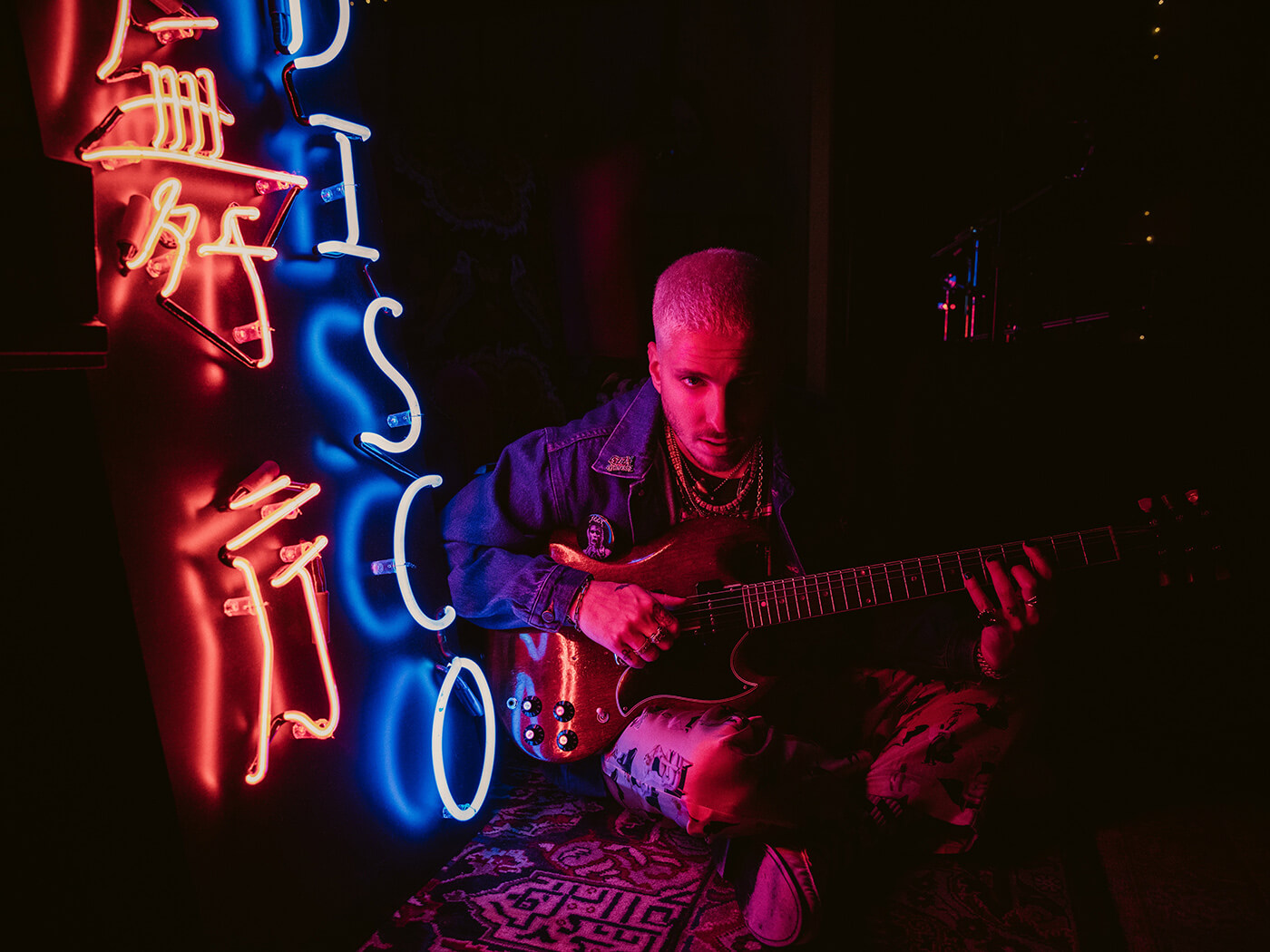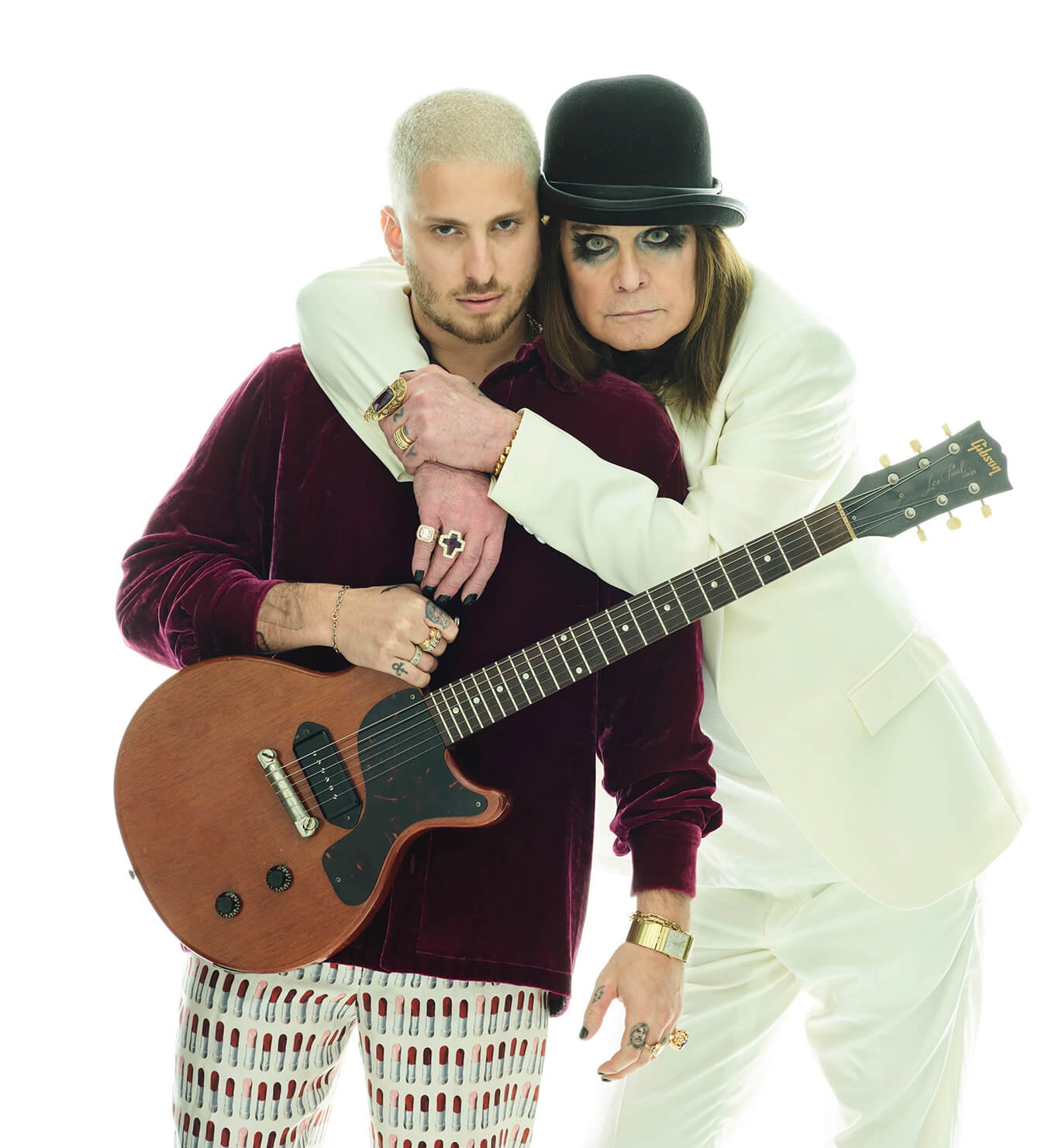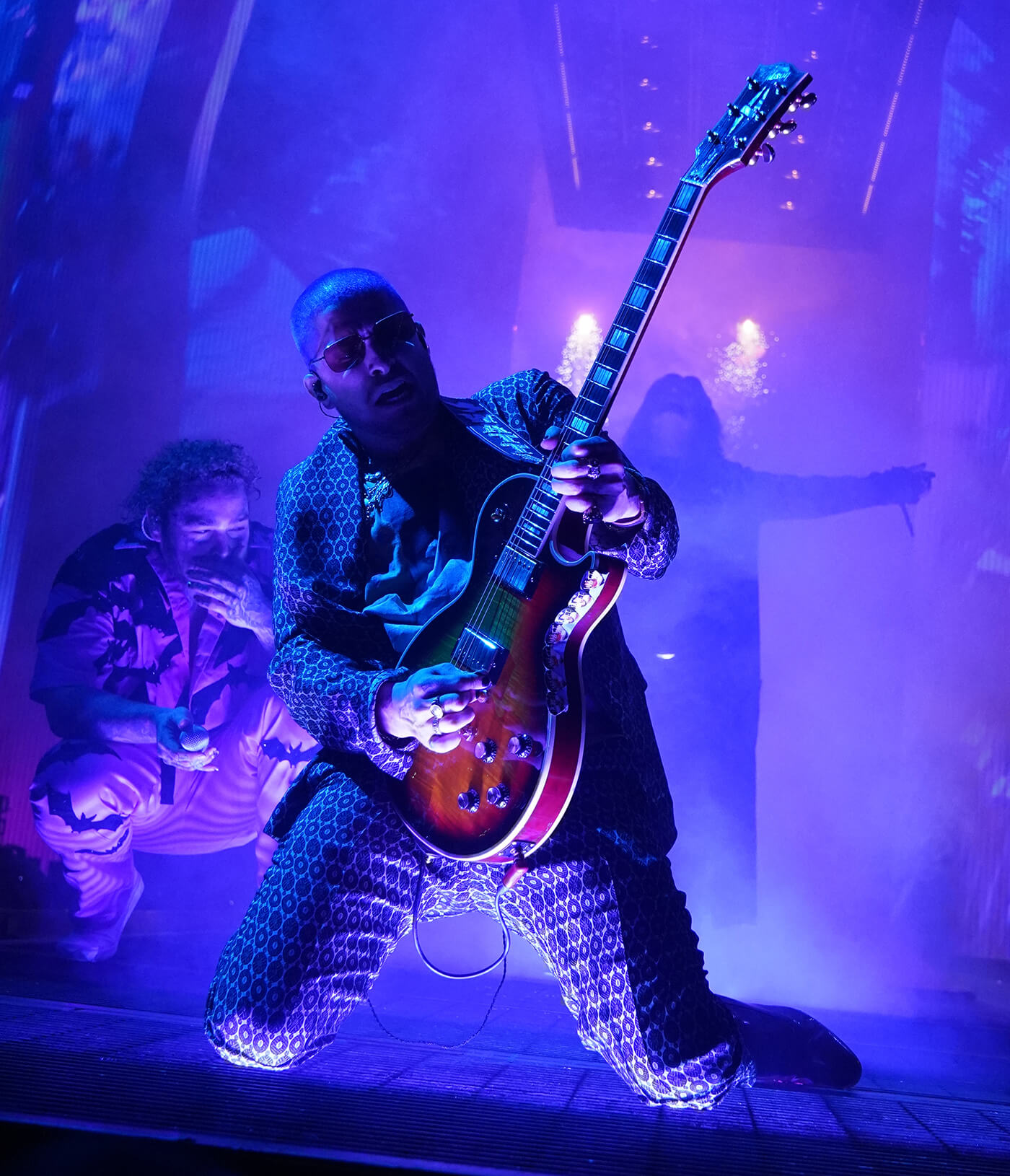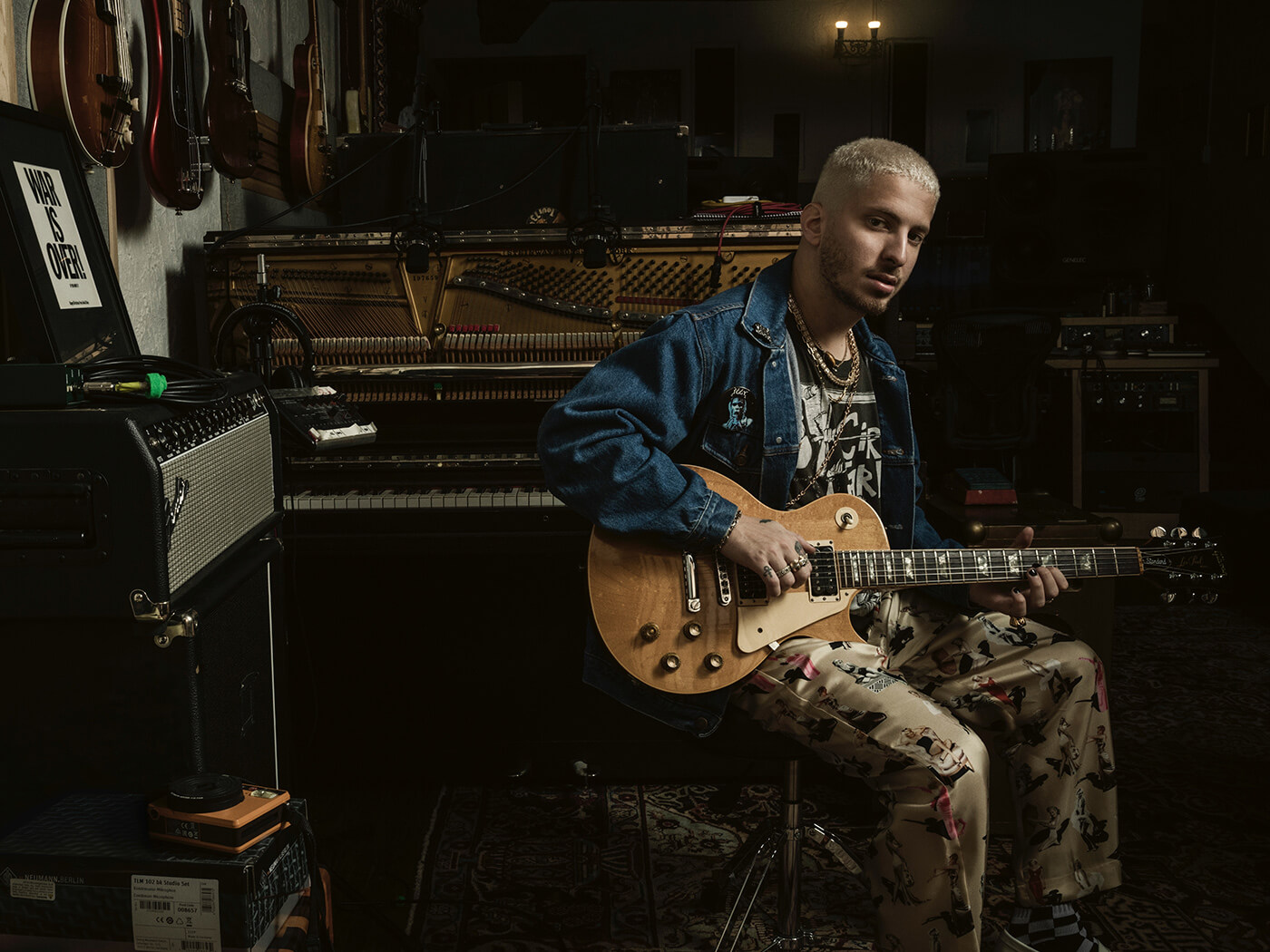Related Tags
Andrew Watt on capping a remarkable 2020 with a Grammy nomination
Dua Lipa and Ozzy Osbourne producer talks process, inspiration and working with his heroes.

Andrew Watt has had a remarkable 2020. Image: Kevin Scanlon
In recent years, Andrew Watt has been lighting up Los Angeles and the wider international music scene as a writer and producer of hit songs for artists such as Dua Lipa, Miley Cyrus, Ozzy Osbourne, Post Malone, and many others. He was recently nominated as Producer of the Year in the Non-Classical category of the upcoming 2021 Grammy Awards for Dua Lipa’s Future Nostalgia (Album of the Year; Best Pop Vocal) and Post Malone’s Hollywood’s Bleeding (Album of the Year).
Previously, Watt won a Grammy for his outstanding work on Cardi B’s Invasion Of Privacy and received nominations for his chart topping collaboration Senorita with Shawn Mendes, and Camila Cabello and Lana Del Rey’s reimagined hit Doin’ Time on Norman Fucking Rockwell. Watt also found the tune to work as executive producer on Ozzy Osbourne’s latest album Ordinary Man, bringing his rock hero out of his dreams and into the recording studio.
The list goes on, with production credits on the album Plastic Hearts by Miley Cyrus and various collaborations this year with A Boogie wit da Hoodie, 5 Seconds of Summer, Louis Tomlinson, Sam Smith and more.
We sit down to talk with this beaming soul to learn about his background in guitar and the love of rock music that led him on his journey as a writer and producer. His energy is infectiously charismatic and charming. And if Watt’s Law shows the relationship between power, amps and voltage, Andrew Watt certainly has his own formula to mix high voltage rock ‘n’ roll with awards. Somebody get this powerful man another Grammy already.

Congratulations on the Grammy nomination for Producer of the Year. How are you? What does it feel like as you await the results?
“I don’t think it’s really hit me yet. I don’t get nervous over things that I can’t control but I’m completely honoured to be nominated. It’s such a cool thing. Every musician watches the Grammys and dreams of being up there one day.”
You have an impressive roster as a producer ranging from rock legends like Ozzy Osbourne to pop queens such as Dua Lipa and Miley Cyrus. How do you transport yourself to all these different styles and genres? Is there a defining trait that’s stayed with you all those years to guide you?
“I don’t know. I grew up in the Napster generation so I had so many different types of music in front of me. I’m influenced by so much and I have a lot of knowledge of different types of music… to be able to work across genres is such a rewarding and fulfilling thing. I’m thankful and grateful everyday. I’m constantly looking forward and focused on what I’m doing.
“I go to other producers’ places and they have plaques on the walls and that’s incredible because it’s their accomplishments and you should be proud but I have no plaques hanging anywhere. I don’t ever want to look at that stuff. I don’t ever want to have a day in the studio where I’m fighting to get a lyric or a right melody and I look over my shoulder and see a ‘quadrillion albums sold,’ then I’d probably say ‘it’s okay if I don’t get that today.’ The second I get comfortable, I will lose what I do which is fight. I’ve got an incredible amount of fight in me. I like to stay in the moment. I think it’s really healthy for creation to be like that.”
Do you think rock ‘n’ roll is dead? What is your outlook on it now that you’ve worked with so many rock legends?
“What’s cool about rock ‘n’ roll is that it became so much more than a genre. You can use it as an adjective, it’s the only genre you can use as an adjective, like look at that person, they’re so rock ‘n’ roll… it’s an attitude and a vibe. That part of it is very much alive today. Technology is something that is a double edged sword. It allows people to create music in a way where it’s so new-age and modern by taking music to another level. A great band that uses technology is Radiohead with their rise from Pablo Honey to The Bends to OK Computer to Kid A.

“Those albums are incredibly different and eclectic. They use technology to their advantage. There are other bands that use technology within the genre and neutered rock. My favourite rock music is not perfect, it has holes. You had to know how to play your instrument to make those amazing Rolling Stones, Black Sabbath, Led Zeppelin and Smiths records. Those are real people playing instruments and you can feel that.
“Rock music needs to have some of that. When making hip-hop and rap, you need things looping. It’s about what the MC is saying. You’re diving into the lyrics and music is supposed to set a vibe to create and set a rhythm for their voice. I love that as well. When we’re talking about rock ‘n’ roll, it’s important to feel real.”
You started your career in the music industry officially when you interned for The Roots. You brought your guitar every day to their jam sessions. What did you hear in that room? Did you observe and listen to those jam sessions so that it developed your own sound as a writer and producer?
“Absolutely. Even before meeting The Roots, I grew up in blues bars and went to jam sessions watching the best unsung heroes of New York City play together on stage. I learned to cut my teeth at The Bitter End and those places. When I was playing with The Roots, I was so enamoured with Captain Kirk Douglas on guitar. Watching him play and lift the crowd up with his guitar solos and knowing when to not play or stop, making space in between of what he was playing.
“Quest never lost the beat for a second and never stopped the groove. I learned so much about the space between playing and not playing from watching those guys. I studied Kirk’s playing and took a lot from his guitar solos and jammed a lot with him. It was like school. I got to watch them play every Tuesday night for over a year. It was great.”
That silent space between the next sound is a metaphor for life too. Gaps in time are a huge opportunity for growth. There are tons of moments where you’re trying to sculpt and create what’s next and sometimes that in itself is so monumentous.
“Those down moments in songwriting or in life are the times when you’re alone with your thoughts. You’re not outputting. They can really make a song that much more emotional or important. A break for a second from whatever intense thing you just heard allows you to process and then move forward.”
As a producer, do you feel like your research for the artist changes by looking for something in particular, how do you process what you’re going to do and give them that input?
“I don’t have one method. They all start with guitar even if the final song doesn’t have a guitar. I pick up a guitar because that’s the way I’ve always written. Every artist is different, sometimes you work with artists that know exactly what it is that they want to do and can really guide you. That was totally the vibe with Dua Lipa on Break My Heart. I had this little idea that I showed her and she thought it was cool then added on what she wanted to do. She showed me the rest of the album which was complete except for this song and told me to pick up the bass to work off it. She led the way.
“Break My Heart was made in three hours and the final vocal that you hear on the record was recorded that day. It was an experience of everyone at their best and following Dua.
“With Ozzy, I’m such a fan of his. I’ve seen every interview and listened to every album of his… there’s nothing about him that I don’t know. I approached his music completely different as a fan of his and asked what would his fans enjoy doing? There’s no one way. It was a true dream. When you look back on a career in music and being blessed enough to be a musician, it’s those kinds of moments that will really stick. I’ve spent so much time with someone I idolise. Ozzy’s like a family member now.

“We talk every single day and we’re working on a second record. His whole family is the most giving family. Ozzy was very sick when we started the first album recovering from his neck surgery and this album gave him another lease on life. It was the first time I’d ever been involved in something musical that was about something greater than the music. It saved this guy’s life. I reached my childhood dream of being able to make rock ‘n’ roll with the exact person I wanted to make it with.”
You originally wanted to become a professional wrestler then made a switch into music. How did you take that leap?
“I loved WWF growing up… I loved the drama of the whole thing. Then I went to see my cousin at a school play that I didn’t want to go to… but I saw this bass player that was rocking out. I watched him the entire night and during the intermission went up and talked to him. He taught me how to play Smells Like Teen Spirit by Nirvana. That was it for me. The wrestling leotards got put in the drawer and a bass was bought the next day. That started my love affair with music.”
What’s your favorite guitar of all time?
“I have hundreds of guitars that I’m so lucky to have. I bought another this morning from a store I love in Nashville called Carter Vintage Guitars. It’s my favorite guitar store in the world. I have this 1930 Martin 0-18 that I got from them that gives me song after song. It’s one of my favorite guitars. I was able to get Mick Ronson’s, who was David Bowie’s guitar player, one of his Les Pauls. I use it constantly and played it on the whole Ozzy album. Mick Ronson is one of my top producers and guitarists, I feel really close to him and his work.”
If creative artists are feeling stuck or struggle to write and produce music, what would you recommend they do? Especially during the pandemic, what should people do when they cannot find as much inspiration?
“Bob Dylan said ‘if you ever feel really stuck, play your favourite song for an hour over and over.’ You’ll eventually find a way to make your own version of it. Great artists borrow, the best artists steal. There’s only 12 notes in the entire scale and two of them are the same note so there are 11 notes. They’ve all been used. You can find your own way to do it and make it your own. Everything is derived from something else. It could be a classical song you write a pop song off of, that’s what Blackbird is.
“It’s one of the greatest songs of all time. Anytime I’m ever really stuck or searching for inspiration, I listen to music that I love and I play it for a long time. There’s other times when you’re fumbling on guitar and something just comes to you. It’s divine intervention and you can’t explain how, it just comes and hits you. That’s the best feeling in the world but there’s no harm in playing along to some of your favourite stuff and riding it like a wave.”
If you were sitting down 10 years ago watching the Grammy Awards on television, would you ever have imagined your nomination for Producer of the Year would become a reality? With all this in mind, what do you want to be known for?
“No, I could never have imagined this happening. I was not ever thinking that I’d be getting awards for the art that I was making. I could never imagine that. My dream was always to make guitar riffs that other people wanted to play or that they’d be able to recognise. The fact that I’ve done that a few times is my greatest joy and thing that I am most proud of. And the rest is still unwritten.”
Find out more via @thisiswatt
